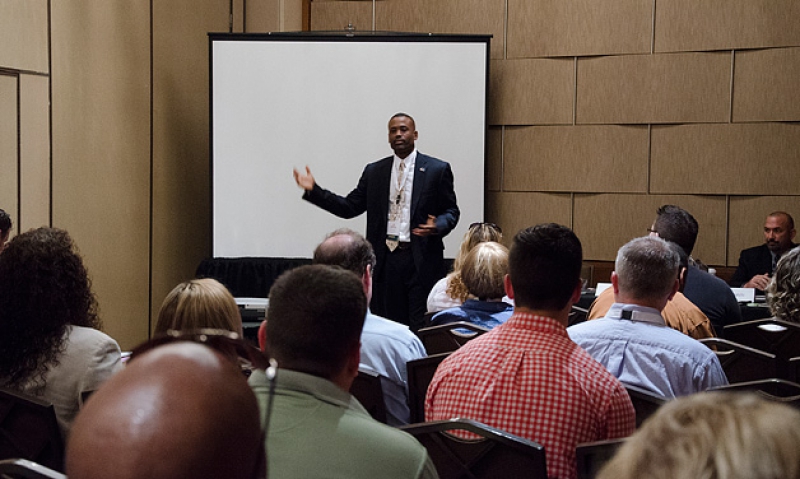
An influx of new veterans as the services shrink could swell the number of homeless.
National Economic Division Deputy Director Mark Walker recently paired with a representative of another veterans service organization to brief the National Coalition for Homeless Veterans (NCHV) Conference in Washington, D.C., on the state of veterans homelessness.
On May 31,Walker – along with Disabled American Veterans colleague Scott Trimarchi – conducted a 75-minute breakout session at the heavily attended event, detailing the role of veterans service organizations in addressing the fact that, on any given night, as many as 75,000 military veterans are without permanent shelter.
Walker told of the Legion’s tireless lobbying efforts on Capitol Hill on behalf of funding for homelessness preventative educational benefits and employment support, such as the streamlining of military to civilian licensing and credentialing. He also spoke of efforts on the local post and department levels, including the charitable provision of housing for homeless veterans. Walker also explained the role of service officers in helping veterans gain the benefits they are due and how that aid helps prevent homelessness.
Still, Walker admitted, "the problem is just huge, especially when you consider the number of new veterans about to re-enter civilian life as we draw down our forces, and the challenge of trying to help homeless veterans with diminished budgets at HUD (Department of Housing and Urban Development) and DoL (Department of Labor)."
Walker went on to discuss weaknesses in the military’s now mandatory, but sometimes ineffectual and incomplete, transition assistance program (TAP). Several audience members, including two recently discharged veterans, amplified a recurring argument that TAP presentations conducted near the end of active duty often fall on deaf ears. As one veteran put it, "We just wanted to get out." Walker referenced a recent survey indicating that the majority of soon-to-be-discharged servicemembers feel unready and ill equipped to enter the now-alien civilian society – a condition that can, in some cases, lead to ultimate homelessness.
Another audience member, board member Marsha Four of the Vietnam Veterans of America, talked of some servicemembers’ predisposition to post-service problems, including homelessness. She noted that a number of young persons join the military in an attempt to solve or escape social, emotional, economic and domestic problems but – as a matter of course – bring the "baggage" to the barracks with them. This prompted another attendee to declare that negative military experiences, such as suffering combat stress and being wounded, exacerbate the servicemembers’ inborn problems.
In response, Marine Maj. David Cote – who was auditing the discussion – cited research he has conducted into methods by which troubled, at-risk servicemembers can be screened for needed personalized counseling and other aids to help prevent destructive or unproductive post-service behaviors. Cote made this research, based upon his own seven years of volunteer service at the non-profit Veterans Village in San Diego, the topic of his recently published Naval Postgraduate School master’s thesis, "Predictors of Retention in a Homeless Veteran Intervention Program." Cote, now an operations research analyst at the Pentagon, challenged VSOs and other stakeholders to become involved in a program of identifying and aiding at-risk servicemembers and veterans.
The American Legion’s National Economic Division has maintained a longstanding relationship with NCHV, whose principals often participate in Legion roundtables and symposia on veteran homelessness. This year, NCHV’s conference spanned three days at the end of May, attracting a host of government officials, service providers, representatives from private industry, supporters and advocates. Major speakers included VA Secretary Eric Shinseki and HUD Secretary Shaun Donovan. Home Depot and Citi were major sponsors of the event.
- Homeless Veterans

